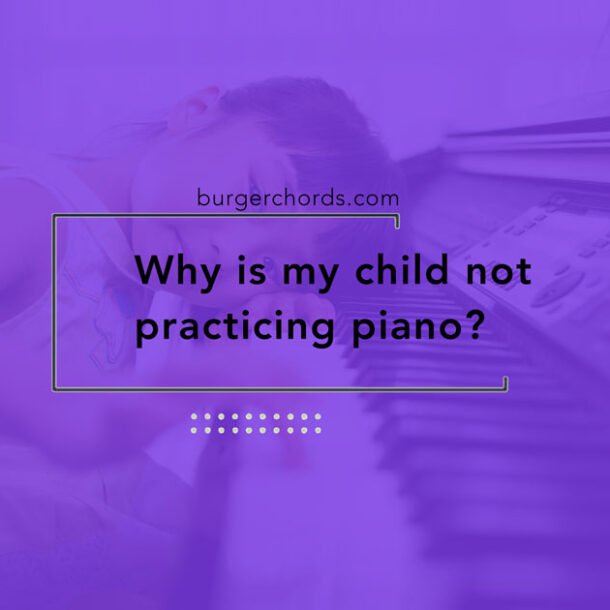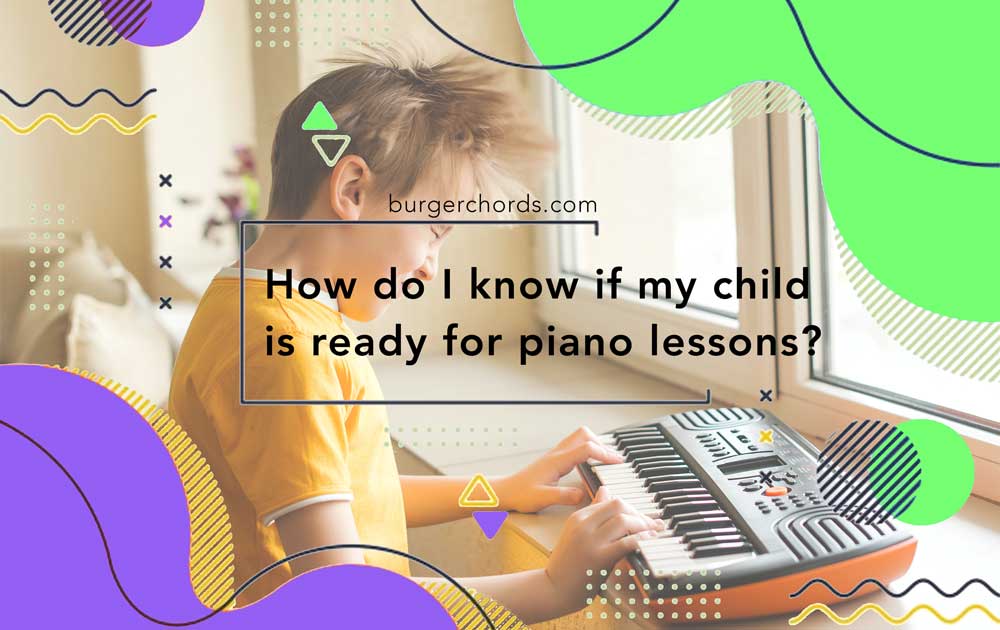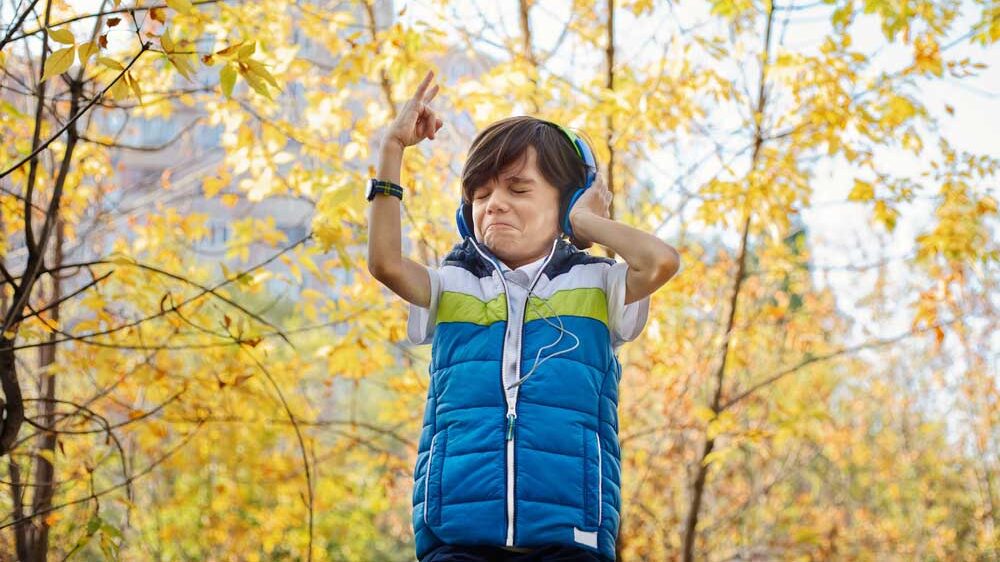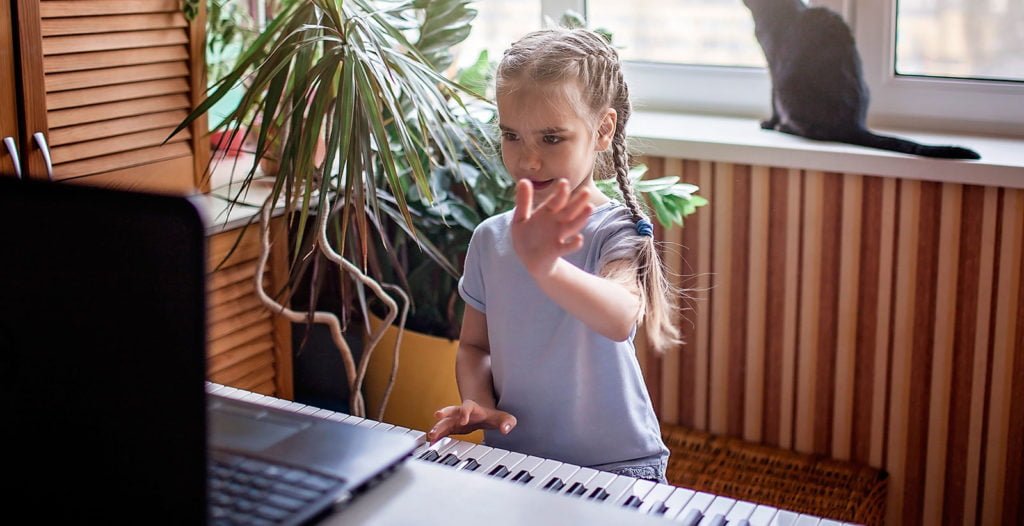

Kids of any age can learn music. You can even find pre-natal music lessons! If you’re unsure whether your child is ready for piano lessons, here are a few questions to consider.
1: Is your child showing natural interest?
2: What kind of music does your child like listening to?
3: What kind of music lessons are you looking at?
Let’s go into more detail.
Is your child showing natural interest?
The most obvious sign your child is ready for piano lessons is they’ll tell you!
Some kids may be interested in music but unsure of what instrument to try. In this case, piano is a great gateway into music lessons. A decent beginner keyboard or digital piano is relatively cheap to buy, making the barrier to starting a little easier than say, violin or tuba! Keyboards also come with a plethora of sounds and drum beats too, which offers a cute way to let your kids try other instruments!
What kind of music does your child like?
Attending weekly lessons is one thing, but playing and practicing in-between lessons is really what it’s about. Kids and adults alike, really need to like it to actually do it.
One way to gauge whether your child is ready for piano lessons is to see if they like piano music. I don’t mean forcing your child to listen to Bach and Beethoven (but they’re excellent composers to listen to)! Rather, be attentive to whatever artist, band, cartoons, or even TV show theme songs they gravitate towards. Picking an instrument AND music style that your child already likes will make lessons – and practice – much more fun!

What kind of music lessons are you looking at?
When thinking about music lessons, it’s handy to first talk about what type of piano lessons there are available. Often, we think of ‘music lessons’ as learning a musical instrument. When actually, there are heaps of different ways to approach music lessons for kids! Here are a few of options:
Private piano lessons
Private piano teachers offer individual or group lessons. There is no set curriculum for private music teaching, so teachers vary greatly in their method and style of lessons. Private piano lessons have the benefit of being flexible and focused on the student’s individual progress. One downside of private lessons is for very young kids, who may find it hard to concentrate or sit still for a 30-minute lesson.
If you’re thinking of private lessons, it’s worth “shopping around”. Most teachers will offer a one-off lesson or trial period. This way both student and teacher can see if it’s a good fit.
Therefore, one great way to see if your child is ready for piano lessons is to go ahead and book one lesson with your teacher of choice. With a one-off lesson, be sure to clarify any obligations for lesson payment, cancellation or enrolment fees with the teacher beforehand.
Find out more about piano lessons for kids with Burger Chords >

Suzuki piano lessons
Suzuki piano method is a specialised way of teaching music. There is a huge body of literature on Suzuki method, but to sum it it up in a few words, the method uses the idea that young kids learn by absorbing everything around them. Think of how much a toddler picks up on your language just by being around you.
A Suzuki student learns by listening to a song over and over, and eventually “copying” what they hear on the piano. This method is great for very young kids under 4 years old because it’s immersive and offers a lot of parent involvement. The downside, for me, is the repetition of songs. Also, it’s a tricky method for parents who don’t play the instrument, as it asks for daily participation in the child’s practice.
Group music classes
Here I’m referring to group music classes like Mini Maestros or Rhythm Tree. They are not specifically instrument teaching, but similar to the philosophy of Suzuki music, it’s giving kids exposure to music. But rather than relying on repetition, group music is more about discovery and movement. This is my favourite option for young kids who aren’t quite ready for piano lessons.
In group music classes, parents and children play musical games, crafts and activities. I love this because it’s social, gets kids (and parents!) playing and dancing, and teaches great music fundamentals like counting, rhythm, and dynamics.
Want to try a one-off piano lesson?
Group piano or keyboard classes
This is a great option for kids who would like to play piano in a more social setting. They’re also a good option budget-wise for beginners as group lesson rates are often a bit cheaper than private classes.
Group piano and keyboard lessons vary a bit. Some are more like ensemble classes, where students learn to play duets or group pieces together, or play piano games as a team. Some are more technology or classroom-based, where lessons follow a set curriculum much like school. There are also group methods like Yamaha keyboard.
I highly recommend students do both private lessons and ensemble (band, orchestra, duets, any group will do!), because playing music with others is fantastic at any age and any level.
Ready? Give piano a go!
While there are a lot of options available, at the end of the day just trust your own and your child’s instinct. If your child is ready for piano lessons, give them a go! It’s worth asking for a one-off lesson with the teacher or school you’re looking at. After the first lesson, if your child is ready to continue with more lessons, you’ll definitely hear about it!

About the author
Michelle is a music teacher and writer who aspires to make music fun and accessible. She’s been playing and teaching piano to kids and adults for over a decade. Michelle’s music writing has been published in The Music, EARMILK, and Cat Brain Land, and she is very fond of cheeseburgers.



1 Comment
[…] Unsure if your child is ready for piano lessons? Read the signs here > […]